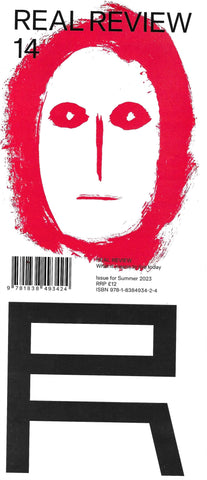Real Review #14
We can't go back, but we don't want to. Nor can we go on like this much longer. What will emerge from such a transitional phase, when the civic body is so lacking in health (physical, moral, political and economic)?
The Renaissance was not an end in itself, but a bridge between two paradigms (feudalism and modernity). It was a cultural movement that diverted history by rediscovering lost pasts. Today, we do not need newness to cut short capitalist realism, to restore a degraded nature, to achieve greater equality. We have everything necessary for change. We only need the will.
The collective trauma of the pandemic has become an excuse for global capital to accelerate the total commodification of everyday life. Everything is for sale. There is more merchandise than love, more sponsored content than truth. No society in human history has demanded so many people be such active participants in producing the contemporary. No contemporary has ever been so aggressively monetised.
As a coping mechanism, many amongst us have decided to check out from reality altogether; preferring to inhabit tailor-made fantasies and simulations. But only children believe that closing their eyes renders them invisible to monsters. When the monsters are real, closing our eyes rather increases the danger.
Inside Real Review 14
Almost everything we think of as normal and commonplace is about to disappear. This acute flux in the social and material order is a source of grief.
We've spent the last half decade traversing its seven stages, as we mourn the passing of a world we thought we wanted: 2018 marked peak shock (#metoo, BLM, XR).
The pandemic was a period of denial (systemic change cannot be deferred). The cost of living crisis is a moment for anger and bargaining. On the horizon is depression (and recession).
Without the ability to accurately assess reality, it will be impossible to achieve acceptance or hope.
Why is it so hard to escape ourselves and grasp what's real? We spend almost a third of our lives connected to the internet, in a space-time of total internal reflection.
Online lacks any randomness or chance; and this illusion of fate and order is at odds with the actual structure of the universe.
Online we are not social beings but com modified identities; immersed in diluted ideas, weak connections and fleeting emotional states that neither originate within us, nor belong to us. We are possessed by the internet, and so dispossessed of life.
This issue is dedicated to Direct Perception: the quest to disentangle our firsthand knowledge of reality from a worldwide web of inherited fantasies. This involves reasserting the binary relationship between what we can prove exists and what we pretend exists. At one pole is a purely rational description of the cosmos. At the other, a rich cultural soup of narrative. A direct perception of reality emerges from the tension between these two extremes.
Material reality is not always meaningful. Human meaning is not really true. But as a charged exchange, we can tell stories about hardcore science in order to comprehend its truths; and we can acknowledge myth as a symbolic function, stripping their power to distort, misinform and miseducate.
For exactly seven years, this magazine has tried to capture something of what it means to live today. The historical arc
it has traced began with a return to authoritarianism. It has progressed through the gradual collapse of globalisation and the natural world. It described the explosion in misinformation, distrust and magical thinking; the emergence of a new civil rights era, and its counterrevolution.
It has reviewed the death of linear time, progress, and the feeling of living through the end of a great epoch. We now understand that Real Review is a magazine recording the terminal period of capitalist modernity.





